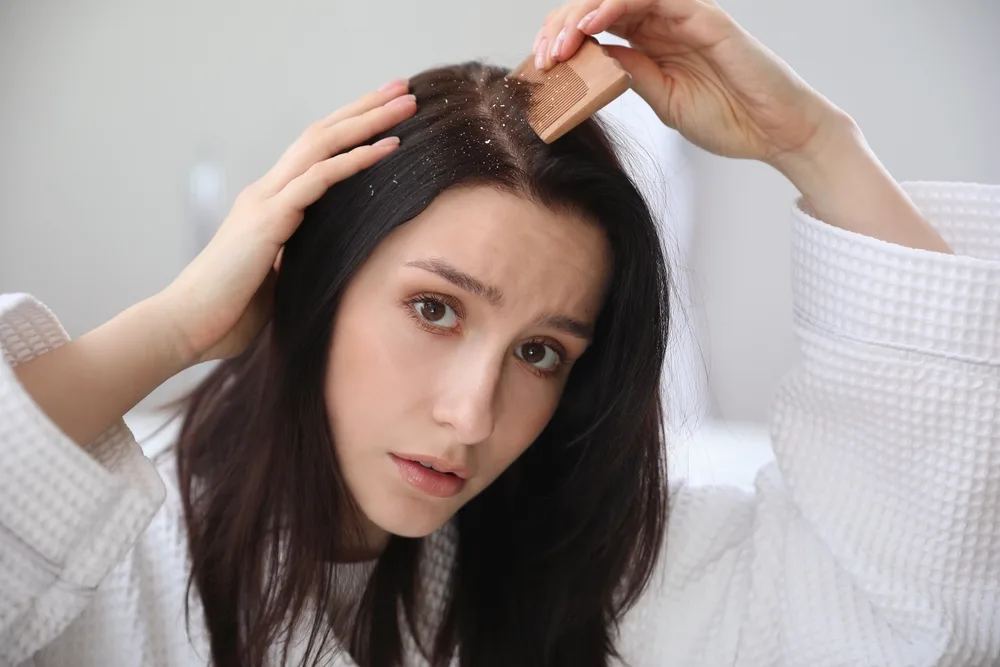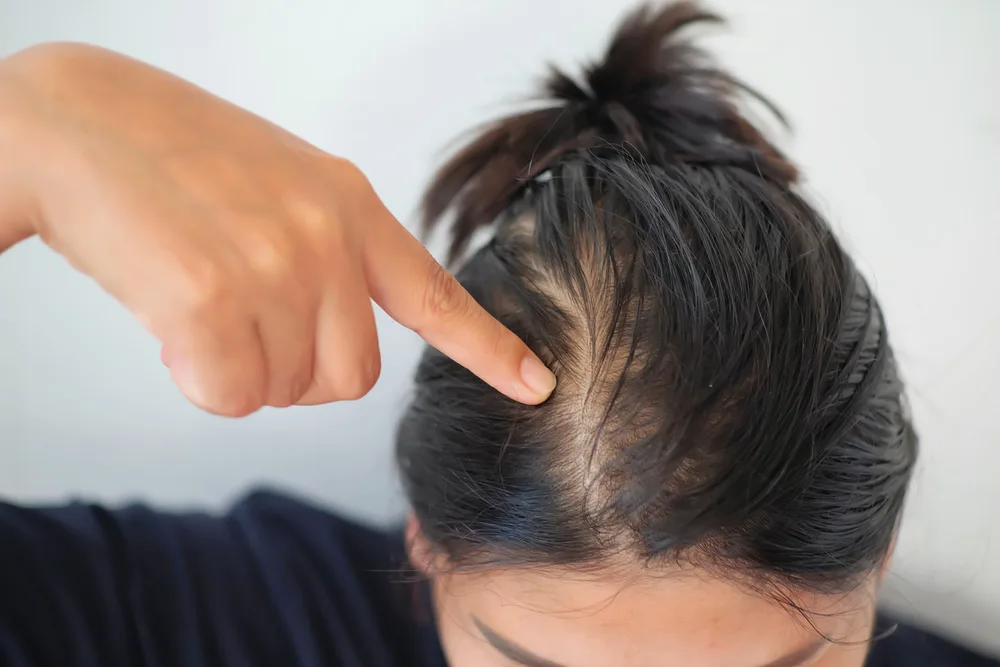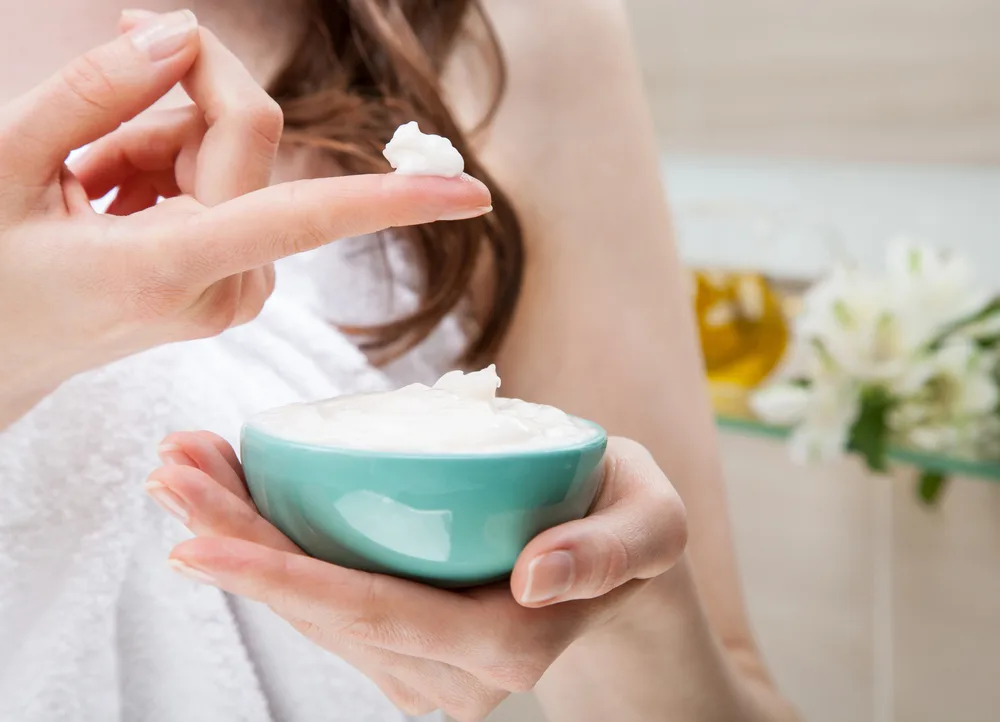Jump to:
Scalp conditioning is hotly debated in the hair community. Some say you should never let conditioner touch your roots, while others say you should do it every time you wash your hair.
So, should you condition your scalp? Read this article to finally find out the truth — you may have been conditioning your hair wrong this whole time.
Should You Condition Your Scalp?
Whether or not you should condition your scalp and roots depends on your hair type and preferences. Some people can benefit from extra hydration and moisture on their scalp, while others may have bad hair days after conditioning their roots.
You can learn who should and should not apply conditioner to their scalp below. Many people think you should only use conditioner below the scalp starting in the middle of your hair shaft. However, there may be better ways to keep your hair shiny and healthy.
On the other hand, slathering your head with super-hydrating conditioner can lead to discomfort for some people and unattractive hair. You might be asking the following:
- What does this mean for your shampooing routine?
- Do you need to condition every time you shampoo?
- Can you condition without shampooing?
While the rules can seem daunting, but the truth is different routines work for different people and hair types. To figure out whether conditioning your scalp is the right move for you and your hair, see how the following considerations apply to you.
You Might Also Like:
- How to Clean a Scalp With Braids Without Washing
- How to Treat and Prevent Mosquito Bites on Your Scalp
- What Exactly Is Scalp Sunscreen (and Do You Need It?)
Reasons to Condition Your Scalp

Pixel-Shot/Shutterstock
The first mission of this article is to debunk the toxic myth that you should never condition your scalp. There are several reasons to condition your scalp.
Healthy Follicles
A great reason to condition your scalp is to keep your hair follicles hydrated and healthy. The conditioning agents can seep into your hair follicles and moisturize them.
Healthy follicles will grow your hair longer, faster, and thicker. Unhealthy, dehydrated follicles can lead to straw-like hair that is brittle and weak.
Dry Roots
This reason makes perfect sense. If your roots are dry, they probably need some conditioner to rehydrate. If your roots feel straw-like and extra dry, it’s time to condition them.
Dry Scalp
A dry scalp can be super uncomfortable. Your scalp may become dry due to your environment, a harsh shampoo, or a lack of sebum production. Applying conditioner to your scalp can prevent tightness and itchiness while increasing your natural oil production.
Dandruff
Using an anti-dandruff shampoo can be effective, but it can also help to condition your scalp and reduce dryness.
Dandruff, or seborrheic dermatitis, is a condition that causes scalp patches, redness, and irritation on the skin. The hydration from the conditioner can soothe any discomfort and reduce flakiness.
Reasons Not to Condition Your Scalp

Alon Za/Shutterstock
While conditioning your scalp can be healthy and helpful, there are a few reasons not to do it. Consider if any of the following reasons apply to you, in which case you should avoid or skip conditioning your scalp for now.
Before Styling
Even if you fall into the categories mentioned above, you should not condition your hair before getting it styled. It can be difficult to style updos or get your hair to hold a curl when it’s weighted down with conditioner.
Most stylists advise clients to shampoo and condition their hair around 48 hours before the appointment. The natural oils in your hair work better with styling products than the synthetic ingredients in heavy conditioners.
Thin or Fine Hair
An excellent candidate for only conditioning from the neck down is someone with thin and fine hair. Thin and straight hair can better distribute the natural oils.
This means that there’s less need for added hydration. There is also less hair that needs hydrating, so the scalp can typically produce enough oil without any help.
Oily Hair
People with dry scalps should condition their hair to improve sebum production. People with oily scalps should avoid conditioning their scalps for the same reason.
You don’t need to increase oil production if you already produce plenty of natural oils. Conditioning an already oily scalp can make it greasier and more uncomfortable.
Dry Ends
Another reason not to condition your roots is to keep your hair consistent and focus on the drier parts. The hair near your scalp is new, so it’s naturally more hydrated and soft than the ends. Focus on conditioning your ends so they can be as luscious as your roots.
How Often to Condition Your Scalp
How often you should condition your scalp will also depend on your hair type and preferences. But the most you should ever condition your scalp is after every time you shampoo.
If you have dry hair, it’s best to rehydrate your scalp and roots after stripping them of their natural oils. It can also help increase sebum production on your scalp to avoid dryness or itchiness.
On the other hand, if you have oily hair, you may only want to condition your scalp once a week or even once a month. Conditioning a naturally oily scalp after every shampoo will only make the hair greasy faster, meaning you’ll have to shampoo more often to keep it clean.
The best advice is to condition your scalp when you think it needs a little moisture. If your head feels tight or itchy, it may be time to condition those roots. Do some trial runs to see what works best for your hair.
Read Next: How Often Should You Condition Your Hair?
Frequently Asked Questions

Maryna Pleshkun/Shutterstock
You can find more information in the related questions section below.
Can I use a leave-in conditioner on my roots?
Yes, but similar rules apply. If you have limp, oily hair, you may not want or need to apply the leave-in product to your roots and scalp. But if your hair is dry, a leave-in conditioner should be applied from your ends to your roots.
What is the best type of conditioner for roots?
If you have fine or oily hair but want to condition your roots to keep your scalp and follicles healthy, you should look for conditioners without silicone. Silicone can make your hair shiny and reduce frizz, but it’s a heavy conditioning agent that weighs down your hair and contribute to oil production.
Should I condition before getting my hair dyed?
Yes! Colorists advise clients to condition their whole head and hair but not shampoo the night before a dye job. A hydrated scalp and conditioned hair will absorb dye better and reduce stinging on your skin. But recently cleansed hair may not have enough natural oil to absorb the dye.
What happens if I don’t condition my scalp?
Because shampoo can be very drying, you risk developing dry, brittle hair if you never condition your scalp.
How can you tell the difference between dry scalp and dandruff?
The flakes from dry scalp tend to be larger and white, while the flakes from dandruff are often yellowish and may even be oily to the touch. Try conditioning your scalp if you notice large, dry flakes on your scalp or shoulders.
So, Should I Condition My Scalp?
In summary, you should probably condition your scalp at some point in your life. Only people with the most active sebaceous glands and fine hair may never need to apply conditioner to their scalp and roots.
The reasons for not conditioning your scalp revolve around appearance and comfort, while the reasons to condition your scalp are more about scalp health.
The odds are, you’ll do more harm avoiding conditioner than using too much. But don’t let anyone tell you there’s only one right way to care for your hair.
